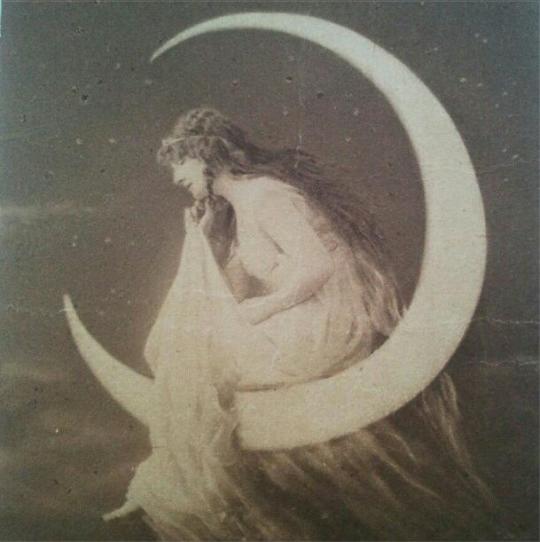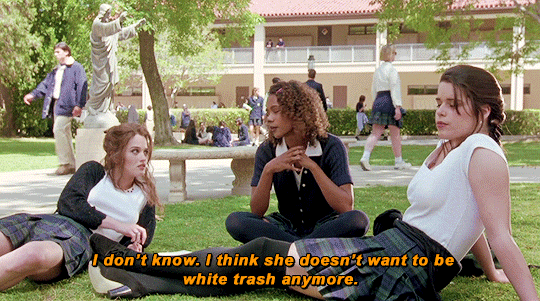Text
maybe if you didn't want to fall through my trapdoor into the rat infested dungeons below you shouldn't have walked onto the rug i carefully placed over it to hide it. rookie mistake.
67K notes
·
View notes
Text
if jennifer of jennifer's body had just invested in some meal planning she could've stretched those dead boys into a week's worth of meals. that's why i'm so excited to announce the sponsor of this post, hello fresh. hello fresh is a meal delivery service that does the work of meal planning and meal prep for you, so you don't have to worry your pretty brunette head about figuring out where your next boy meal is coming from
34K notes
·
View notes
Photo







Megan Fox as Jennifer Check in Jennifer’s Body (2009) dir. Karyn Kasama
2K notes
·
View notes
Photo




Portrait of a Lady on Fire (2019) | dir. Céline Sciamma
19K notes
·
View notes
Photo


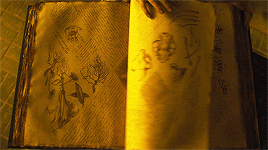


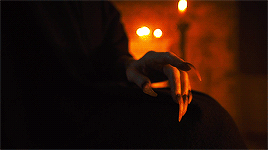

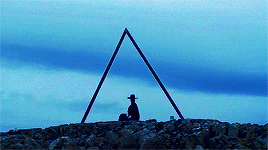
Tell me the fairy tale again. It’s too scary, you’ll start seeing things that aren’t there.
Gretel & Hansel (2020) dir. Oz Perkins
415 notes
·
View notes
Link
This is my tarotscopes for April!
1 note
·
View note
Text
Film Review: How Booksmart Celebrates Modern Female Friendships
By: Abygai Peña
Olivia Wilde’s directorial debut gives the coming of age genre a much needed makeover. Booksmart introduces BFFs Amy and Molly at the end of high school. We find them rethinking their commitment to academics when Molly overhears her classmates making fun of her while she’s using her high school’s gender neutral bathroom. At first, this does not seem to bother Molly. Her achievements allow her to let these comments roll off her back. Molly confidently brushes off her peers by letting them know about her successful future, but they inform her of their own acceptances to the ivy leagues. Now filled with regret, Molly convinces a reluctant Amy to attend Nick’s biggest end of year high school party.
Molly and Amy realize they have no idea where Nick’s party is because they’ve never interacted with their peers outside of academia. So, Molly calls Jared, a classmate who is as rich as his is desperate for friends, and he brings them to his graduation party which is packed with caterers circling an empty yacht with feasts of trays and DJs spinning to a crowd of Molly, Amy, and Jared. One guest appears–a drugged Gigi–who scares off Molly and Amy by erratically jumping overboard. This prompts Amy to call it a night as they’ve reached their goal to experience a party before graduation. Disappointed, Molly still wants to attend a “real party” and responds with their sacred code to request unconditional support, “Malala.”
This aspect of their friendship embodies themes from Kayleen Schaefer’s novel, Text Me When You Get Home. In this novel, Schaefer discusses the personal and societal effects of uplifting modern female friendships. Schaefer credits solidarity when expanding on the title of her novel in an interview with NPR saying:
Every woman I asked about the title when we were figuring out what to call the book said, I say that. I absolutely say that. I always tell my friends, text me when you get home. It's about safety, first of all. But more than that, it's about solidarity. It's about saying, I know what it's like to be alone on the street or walking into an empty apartment. And so I'm with you no matter if you're in front of me, no matter if you're walking away. I've got you.
This idea of ‘solidarity’ and ‘I’ve got you’ permeate the story which is undoubtably the most admirable aspect of this film.
In many ways, Amy and Molly’s friendship is reminiscent of Abbi and Ilana’s relationship in Broad City–a TV show acclaimed for its depiction of female friendships. In both stories, the pairs find themselves sticking together through strange, hectic, and even surreal circumstances. Booksmart’s plot actually parallels Broad City’s final season as both pairs are faced with separation. After graduation, Molly is sticking around for the summer before college and during a blowout fight at Nick’s party it is revealed that Amy is taking a gap year in Botswana. Similarly, Broad City’s couple part ways when Abbi is accepted into an artist’s residency in Boulder, Colorado whereas Ilana stays in New York to begin a graduate program in hopes of becoming a therapist. All these characters must adapt to independence and reconcile that these changes will allow them to fully grow into themselves.
Like Abbi and Ilana, the friendship between Amy and Molly is aspirational. The undying support they give each other throughout the missteps they have in the film is something we are now celebrating after years of women portrayed on screen as catty toward one another. Booksmart’s talented team of female writers tell an authentic story that highlights the complexity of our friendships, our arguments, and growth with our besties.
7 notes
·
View notes
Text
Film Review: Angelo Shows Us That We Are Still Learning About Racial Sensitivity
By: Abygai Peña
After seven years, Markus Schleinzer follows his debut feature Michael with the long-awaited Angelo a biopic about African slave Angelo Soliman a child selected by an 18th-century comtesse (Alba Rohrwacher) and educated as a Viennese court entertainer. Schleinzer’s film recounts Soliman’s journey as a black man who must navigate 18th century high society.
Cinematically, Angelo Soliman’s story chronicles sections of his lifetime showing off what is the most striking part of this film: the wardrobe and set design. Meticulous and with incredible attention to detail the Wardrobe Department adorns Angelo in the most lavish attire throughout the film which helps illustrate and contextualize his rank in society. At the height of his career as a Court Entertainer, Angelo is literally star-studded in a cloak of gems and rhinestone. This cloak returns later in his life after a secret marriage to a white woman leaves him out of favor with the Viennese aristocracy. Soliman tears apart his blazing red cloak and selling the gems to support his family after his expulsion from the court.Soliman takes this adversity with a quiet calm. Variety’s Guy Lodge calls “Markus Schleinzer's second feature is formally stunning and politically seething.” Lodge references Soliman’s expectation to act as entertainment, not human.
In fact, Angelo has received much praise for its strong and silent portrayal of Soliman. With Screendaily applauding Schleinzer’s character development, “Schleinzer, like his central character, uses silence as a tool and a weapon.” Schleinzer’s frigid rendering of Angelo Soliman a man who rose the ranks of high society as an intellectual, as a man who became the Grand Master of his Freemason lodge, and as a man who was well-respected for his forward thinking makes hardly any sense.
Keith Moore, author of Freemasonry, Greek Philosophy, the Prince Hall Fraternity and the Egyptian (African) World Connection, acknowledges Soliman as an asset to Europe’s 18th century Freemason practice as he contributed to redefining Freemasonry as a scholarly ritual and still holds regard as the “Father of Pure Masonic Thought.” It is unlikely that Soliman was as hushed and surly as the film suggests. “Silence as a tool and a weapon” is dismissive to an audience that relates to the pain of being silenced. To infer that silence was a choice for Angelo Soliman shows a disregard for his lived experience as the only black person in Viennese court. Schleinzer’s voiceless representation of Angelo Soliman speaks to the dismissal of black intellectualism. When does a main character with plenty to express about his situation end up with the least amount of lines in a narrative? Angelo’s mute portrayal proves sophomoric, indeed.
0 notes
Text
Film Review: 'The Chambermaid' Salutes Women in Thankless Caretaker Roles
By: Abygai Peña
Lila Avilés’ debut feature, The Chambermaid, depicts the experience of Eve, a young single mother working her way up in the elite Mexico City hotel industry. Avilés journey from theater production to filmmaking parallels the protagonist’s coming of age as they both approach new chapters of their lives with curiosity and determination. Through Avilés’ lens, Eve's work week blurs into an endless stream of changing sheets, waiting on guests, and even babysitting for a wealthy guest. Eve’s motivation to take care of herself and her son Reuben who we hear about often, though never appears on screen encourages her study in pursuit of her GED in addition to her long days at the hotel. Through highlighting Eve’s perseverance The Chambermaid brings humanity to the thankless roles of invisible women in the service industry.
Whirring and buzzing sounds that fill tight corners and cramped hallways in The Chambermaid induce a sense of claustrophobia for the audience. Enhanced by Carlos Rossini’s cinematography whose tight shots frame Eve engulfed in stark white towels and hotel commissary while confined in the linen closets capture how lodged Eve is in her situation.
Eve’s relationships at the hotel prove fruitless. It’s no surprise that she is unable to advance her career in the hotel industry. Whereas, with Avilés’ curiosity in moving from the theater space into film. Avilés found support from producer Tatiana Graullera who stood by her through a timely 17 day production for The Chambermaid, and helped pull through for post production funding by assisting Avilés with applications for grants and government initiatives. In contrast, Eve seldom benefits with her interactions with peers or superiors. Most of the time these interactions just add to Eve’s back-breaking workload.
However, Eve’s relationships are not the only aspect of this film that were found sterile–the landscape of the hotel was cold, white and barren. White linen, white towels, white walls… counting it all could go on forever. It is easy to say that Eve was the most visually stimulating artifact within the composition which gave an almost documentary feeling to the film.
This documentary/non-fiction feeling also comes from the films “soundtrack”. The soundstage of The Chambermaid was without music but imbued with foley–machines whirring, cafeteria echoes, steps, and running water but no music. This aspect of the film exemplifies the sterility of Eve’s experience as a cog in the hotel machine. Avilés does a brilliant job personifying the hotel as a multifaceted space with a class system that reeks of privilege and exploitation.
0 notes
Photo

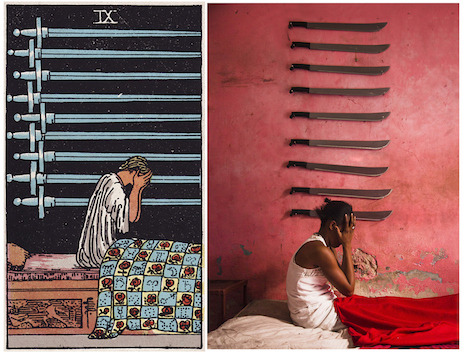
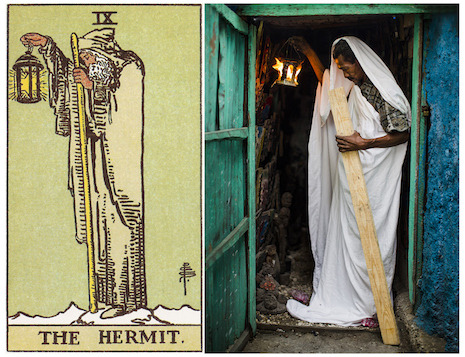
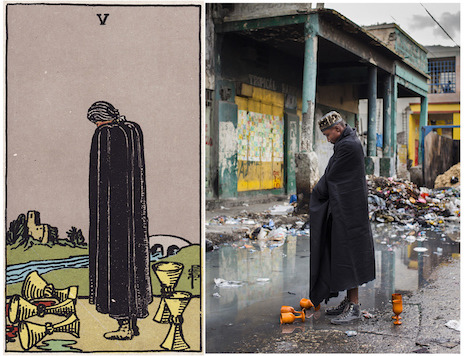
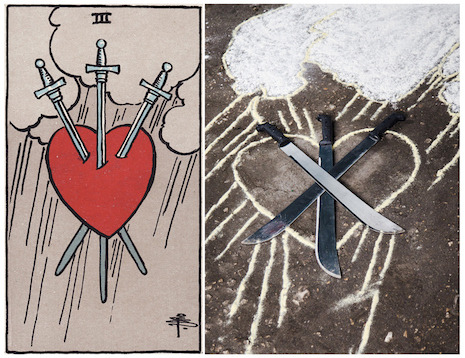
‘The Ghetto Tarot’ - Haitian artist group, Atis Rezistans, re-creates the classic tarot deck into scenes, people and locations from their native Haiti.
(Source)
92K notes
·
View notes





